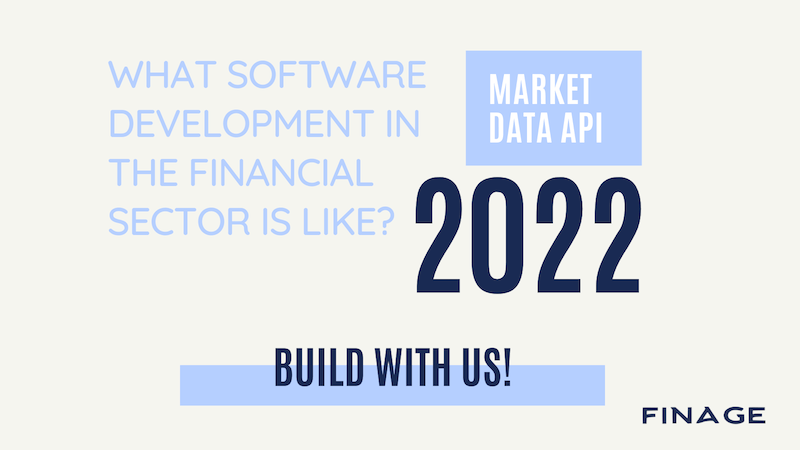Back to Blog
by Finage at October 16, 2021 4 MIN READ
Technical Guides

What Software Development in the Financial Sector is Like?
You will learn the working environment in the finance industry for software engineers, the encounters between software engineers in other industries in this blog.
Table of Contents
Software Engineers in the World of Finance
Demand for High-Performance, Scalable and Responsive Systems
The Good Side of Software Development in Finance
The Bad Side of Software Development in Finance
Final Thoughts
People generally like to draw the differences between the culture at tech and financial companies when it comes to hiring software engineers. In today's article, the working environment for software engineers in the financial sector is more or less the same as for software engineers in other sectors.
Software Engineers in the World of Finance
When software engineers find employment opportunities in financial institutions, they need to understand what they are getting themselves into. It's still a software business, not a finance business. This means that their responsibilities include analyzing, forecasting, and developing software solutions based on tons of financial data at their disposal. There is a high pressure on software engineers as the business dynamics are high in financial institutions such as banks. A company could lose millions of dollars if software gurus make a single mistake in a transaction.
To understand the responsibilities of software engineers in financial institutions, it is necessary to first understand how these companies operate. It's also good to know the type of challenges organizations face and how software engineers can solve them. Here are some of those concerns and responsibilities for software developers.
Demand for High-Performance, Scalable and Responsive Systems
Like any other company, financial institutions need certain systems to work well. Only software engineers can ensure that these systems are scalable and responsive under high load. These systems can help attract more financial opportunities or help companies dominate their industry.
Information security
Cases of system breaches or credit card theft are common in finance. Software developers need to help institutions like banks to prevent any information security threats. Their mission will require developing programs that can combat threats.
Wide Mix of Technologies
Software developers in the financial world have to work with different types of technology as well as work to tight deadlines. Its mission is to use these technologies to design, develop and deploy effective software solutions. Over time, they need to learn how to integrate different technologies into their business.
The Good Side of Software Development in Finance
Software engineers employed in finance companies can carry out their activities from the front or back office. Those who work in the front office and perform tasks such as coding business strategies are likely to earn high salaries. Remember that there are different types of financial companies. Buyers and hedge funds are known to pay software developers higher than banks. Also, the income developers earn depends on their background and experience level.
Moving from working at a tech company to working at a finance company is easier than the other way around. Financial firms have a tendency to attract software engineers. In addition, they tend to hire only the best and brightest people. These firms know that a simple programming or code mistake can save them millions in cash or even bankrupt them. Accordingly, they only want the best engineers. The work culture in financial companies is suitable for software engineers. Programmers enjoy salary bonuses and appraisals after about two years, depending on the company that hires them. They also fulfill their duties in workplaces equipped with all the resources they need. In their daily tasks, they work on machine learning, high-performance systems, data mining, web security, mobile applications, and large amounts of data.
The Bad Side of Software Development in Finance
Although the financial sector promises more positive areas to software developers, this sector also has some disadvantages. Most practitioners in the industry see software development as an easy task. They ignore the fact that it takes days to think, design, develop and deploy a software solution. They expect programmers to come up with such a solution in a small amount of time. They also expect the program to be free from bugs or distribution problems. Some auditors assigned to software engineers in financial institutions are impatient. Also, a programmer has unrealistic expectations of how he should do his job. Working with someone who doesn't understand how you perform certain tasks is a frustrating experience. It's also a daunting experience to spend hours or days trying to fix a bug with a little help. There are financial companies that get negative publicity because of their tendency to kill programmers' careers.
Financial firms promise software engineers good job security when hiring them. But as time passes, they can't keep their word. Lawsuits about unfair dismissal of programmers are increasing all the time. These firms are quick to fire programmers without any notice. It is unrealistic to give professionals a few days to complete tasks that take months or years and then fire them when they fail to meet the deadline.
Final Thoughts
If we talk about the facts, the only concern of the CEOs, CFOs, or CTOs of financial companies with the work of software engineers is how their company will profit from the business. They also want to know how the software solutions developed will help them position themselves above their competitors. As software developers start working for these companies, their job is to address these concerns. They need to create accounts faster, speed up checks, cause fewer errors, and do things faster with software solutions. We hope that this blog post will be beneficial for you. We will continue to create useful works in order to get inspired by everyone. We are sure that we will achieve splendid things altogether. Keep on following Finage for the best and more.
You can get your Real-Time and Historical Data with Finage free Data API key.
Build with us today!
Featured Posts

Impact of AI on Forex Trading: Analyzing Advancements & Integration
April 19, 2024

Why Crypto & Blockchain Are So Important in 2024?
April 18, 2024

Emerging Markets and Their Influence on Global Stock Indices
April 17, 2024

Web3 Security Challenges and Solutions
April 16, 2024

Quantum Computing and Its Potential Impact
April 15, 2024
Categories
Forex
Finage Updates
Stocks
Real-Time Data
Finage News
Crypto
ETFs
Indices
Technical Guides
Financial Statements
Excel Plugin
Web3
Tags
Software Engineers in the World of Finance
Demand for High-Performance
Scalable and Responsive Systems
The Good Side of Software Development in Finance
The Bad Side of Software Development in Finance
Join Us
You can test all data feeds today!
Start Free Trial

If you need more information about data feeds, feel free to ask our team.
Request Consultation
Back to Blog
Please note that all data provided under Finage and on this website, including the prices displayed on the ticker and charts pages, are not necessarily real-time or accurate. They are strictly intended for informational purposes and should not be relied upon for investing or trading decisions. Redistribution of the information displayed on or provided by Finage is strictly prohibited. Please be aware that the data types offered are not sourced directly or indirectly from any exchanges, but rather from over-the-counter, peer-to-peer, and market makers. Therefore, the prices may not be accurate and could differ from the actual market prices. We want to emphasize that we are not liable for any trading or investing losses that you may incur. By using the data, charts, or any related information, you accept all responsibility for any risks involved. Finage will not accept any liability for losses or damages arising from the use of our data or related services. By accessing our website or using our services, all users/visitors are deemed to have accepted these conditions.